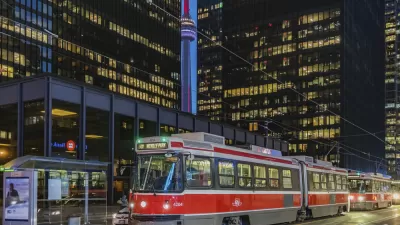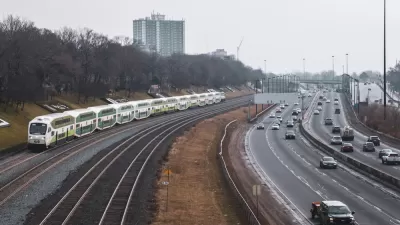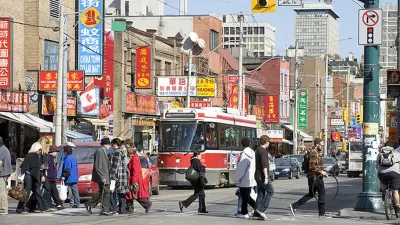Additional sales taxes, increased property taxes, and a tax on commercial parking spaces are just some of the 11 funding options being considered to pay for a long overdue transit expansion in the Greater Toronto Area (GTA).
According to Ontario’s Premier, Ontarians will know by next spring how the provincial government wants to pay for the public transit expansion that is needed to make a dent in the GTA’s traffic gridlock. On Wednesday, the Premier announced the appointment of an expert panel to examine the controversial, but crucial, funding options identified by Metrolinx, the province’s transit authority.
“Releasing the government’s transit-funding plan in the spring could mean the measures will be included in a March budget” writes Rob Ferguson, “requiring support from the Progressive Conservatives or New Democrats to avoid an election.”
“But both parties,” he continues, “have rejected tax increases to pay for transit expansion, saying Ontarians are hard-pressed to afford another hit in the pocketbook.”
FULL STORY: Transit: Kathleen Wynne names panel to report on revenue sources

Planetizen Federal Action Tracker
A weekly monitor of how Trump’s orders and actions are impacting planners and planning in America.

Restaurant Patios Were a Pandemic Win — Why Were They so Hard to Keep?
Social distancing requirements and changes in travel patterns prompted cities to pilot new uses for street and sidewalk space. Then it got complicated.

Map: Where Senate Republicans Want to Sell Your Public Lands
For public land advocates, the Senate Republicans’ proposal to sell millions of acres of public land in the West is “the biggest fight of their careers.”

Orange County, Florida Adopts Largest US “Sprawl Repair” Code
The ‘Orange Code’ seeks to rectify decades of sprawl-inducing, car-oriented development.

Maui's Vacation Rental Debate Turns Ugly
Verbal attacks, misinformation campaigns and fistfights plague a high-stakes debate to convert thousands of vacation rentals into long-term housing.

San Francisco Suspends Traffic Calming Amidst Record Deaths
Citing “a challenging fiscal landscape,” the city will cease the program on the heels of 42 traffic deaths, including 24 pedestrians.
Urban Design for Planners 1: Software Tools
This six-course series explores essential urban design concepts using open source software and equips planners with the tools they need to participate fully in the urban design process.
Planning for Universal Design
Learn the tools for implementing Universal Design in planning regulations.
Heyer Gruel & Associates PA
JM Goldson LLC
Custer County Colorado
City of Camden Redevelopment Agency
City of Astoria
Transportation Research & Education Center (TREC) at Portland State University
Camden Redevelopment Agency
City of Claremont
Municipality of Princeton (NJ)





























